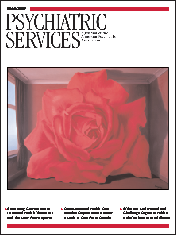Not too many years ago a book with a title such as "Families and Mental Disorders" would almost certainly have dealt with the family's role in generating or exacerbating the mental illness of one of its members, with correlative treatment models to remedy family dysfunction. The family burden literature was the first to assess the effects of mental illness on the family. These effects typically have been characterized as objective burden (the family disruptions, financial losses, and multiple tasks associated with caregiving, including negotiating the mental health, medical, welfare, and sometimes criminal justice systems) and subjective burden (the emotional costs to the caregiver and the consequences of societal stigma).
For the most part, the chapters in Families and Mental Disorders: From Burden to Empowerment illustrate the impact of these stressors on family interactions. The book begins with a thoughtful integration of the family burden literature with a discussion of appraisal and coping in families of persons with schizophrenia, together with the impact of family environment and models of family interventions. Although family burden research has focused on schizophrenia—and the literature indicates that burden seems highest with this disorder—individual chapters are also devoted to families of individuals with dementia, major depression, bipolar disorder, severe anxiety disorder, eating disorders, and drug abuse as well as children with mental disorders.
The book has a stellar cast of multinational editors and contributors. Norman Sartorius, currently with the University of Geneva, Switzerland, is former director of the mental health division of the World Health Organization (WHO) and a major facilitator of international research on schizophrenia. Julian Leff, from the United Kingdom, pioneered the research on expressed emotion in families, including WHO's cross-cultural comparisons. The other editors are from Spain, Italy, and Egypt. Most contributors are major researchers in this field, so the chapters represent state-of-the-art knowledge and are written with a high level of rigor and sophistication. Christine Barrowclough writes about families of persons with schizophrenia, and Gabor Keitner writes about bipolar disorder. Elizabeth Kuipers and Paul Bebbington summarize the research on family burden and coping strategies. Ian Falloon, arguably our major researcher on family psychoeducation, thoughtfully explores the literature on various models, including William McFarlane's findings on the benefits of the multifamily group. Margaret Leggatt, formerly head of the World Fellowship for Schizophrenia and Allied Disorders (WFSAD), writes of the role of family organizations throughout the world. Radha Shankar, a psychiatrist in Chennai, India, and former vice-president of WFSAD, writes about cultural perspectives in family involvement and the process of organizing and empowering families in India.
This book thus goes well beyond family burden—and family interventions—to highlight one of the major coping strategies developed by families. Beyond gaining insights from individual and group psychoeducation, beyond learning to understand the substrates of mental illness and how to modify their own behaviors, many families want to do something on a larger scale. They want to ameliorate an often poorly organized and unresponsive mental health system, promote basic and applied research, and improve social policy on mental illness. In addition to learning how to be optimally supportive of their ill relatives, families have realized the personal and political benefits of organizing.
This book is an important and timely work that leads us into a new era in mental health care. Most chapters nevertheless emphasize the importance of family interventions by professionals. They provide the empirical basis for particular models of educating families and easing their burden. But the concept of "family empowerment" goes far beyond the individual case. It opens a window to the political importance and the intrinsic therapeutic value of the advocacy role. Advocacy offers families external as well as internal mastery over their destiny and that of their loved ones and a means to improve the prospects of the whole community of people with mental illness. We need more books, and more research, to explore the process and effects of this historic development.

